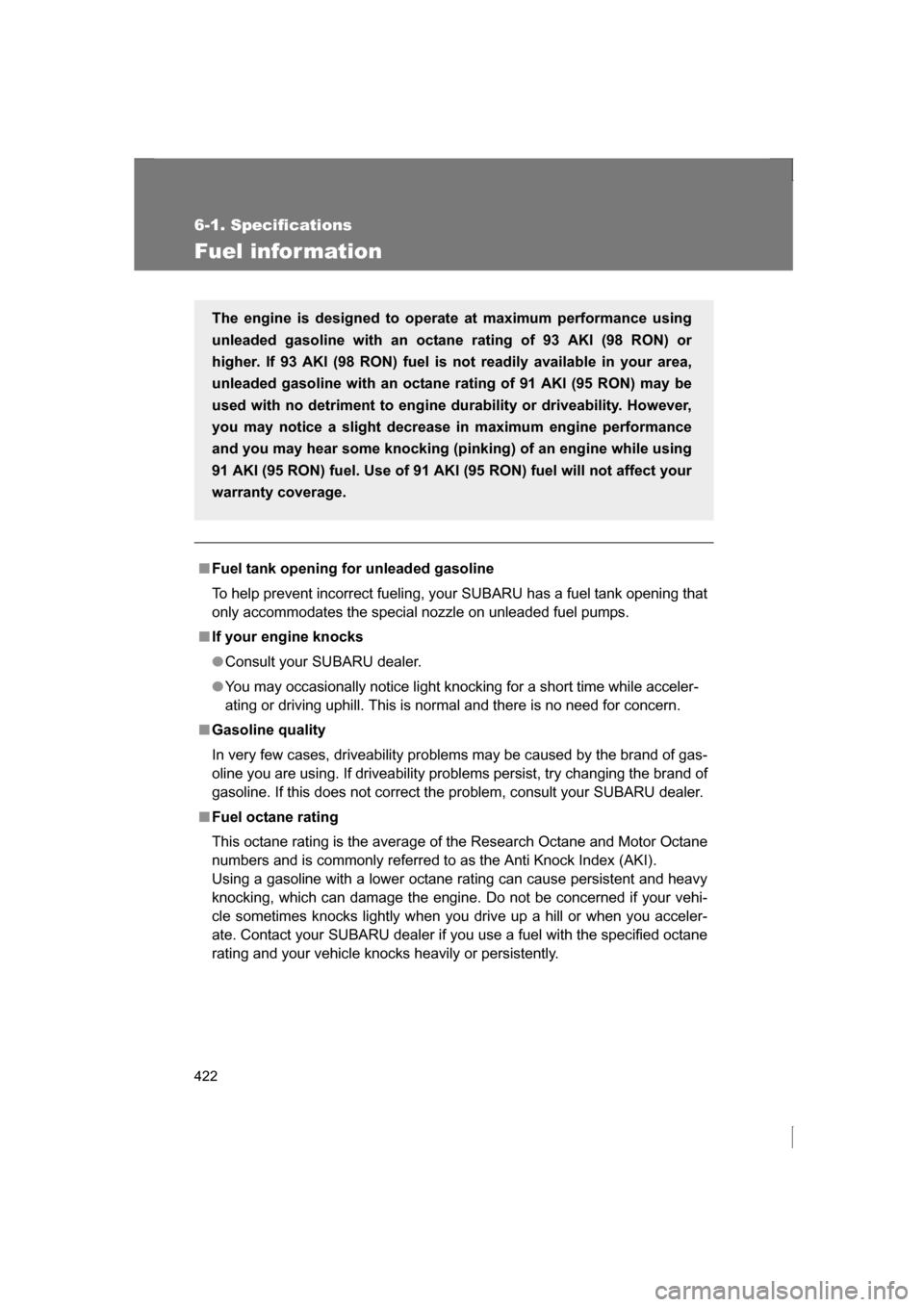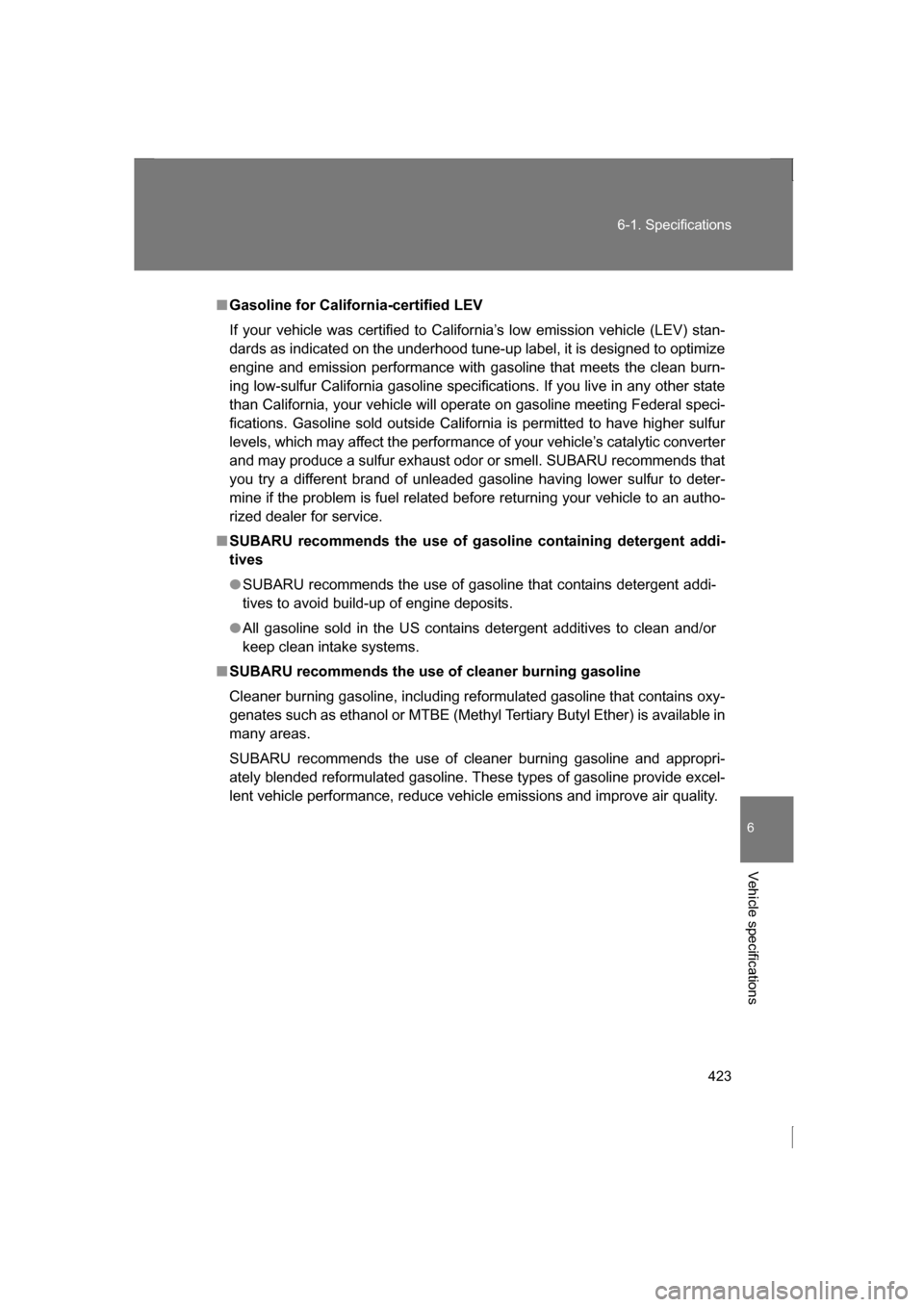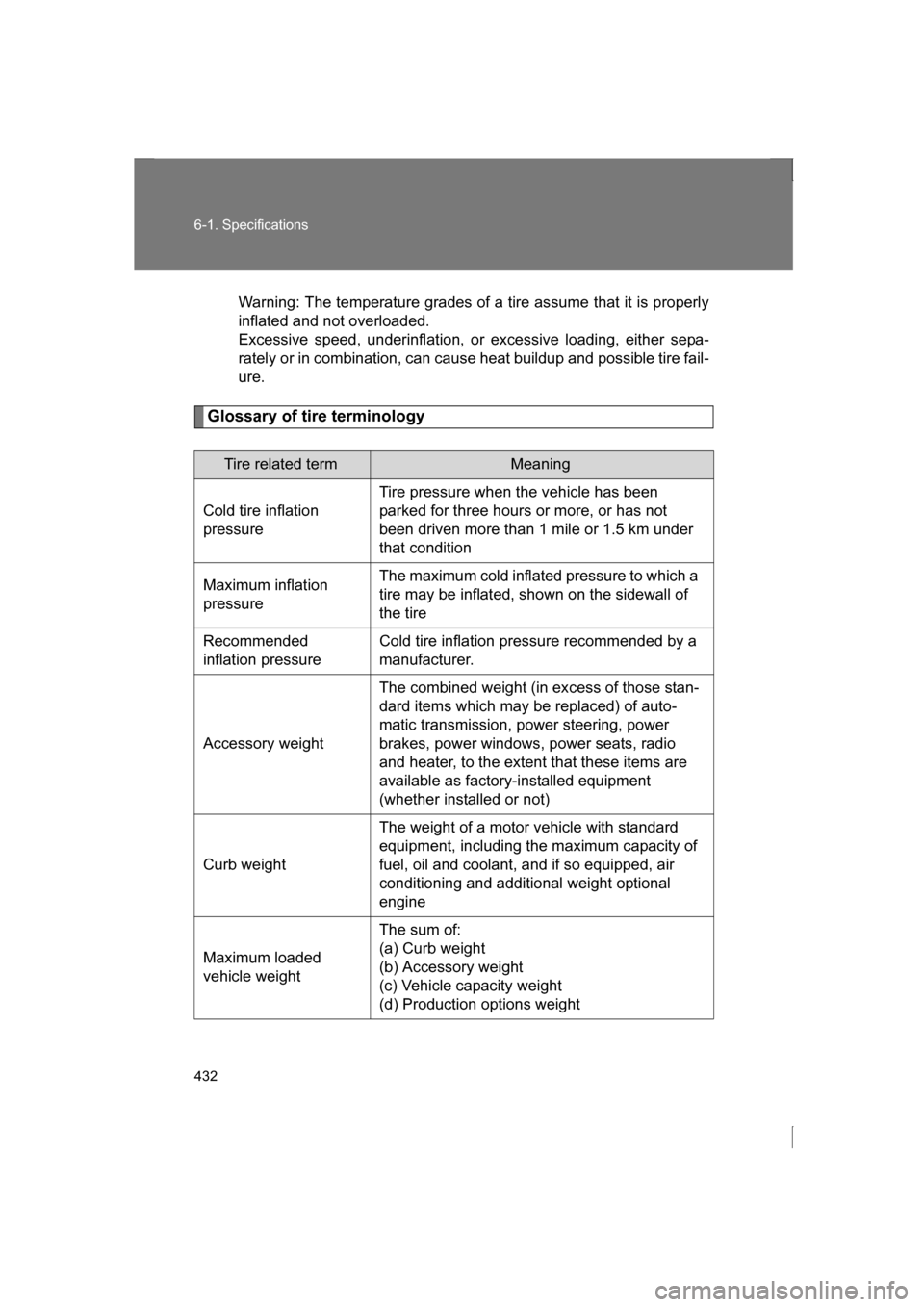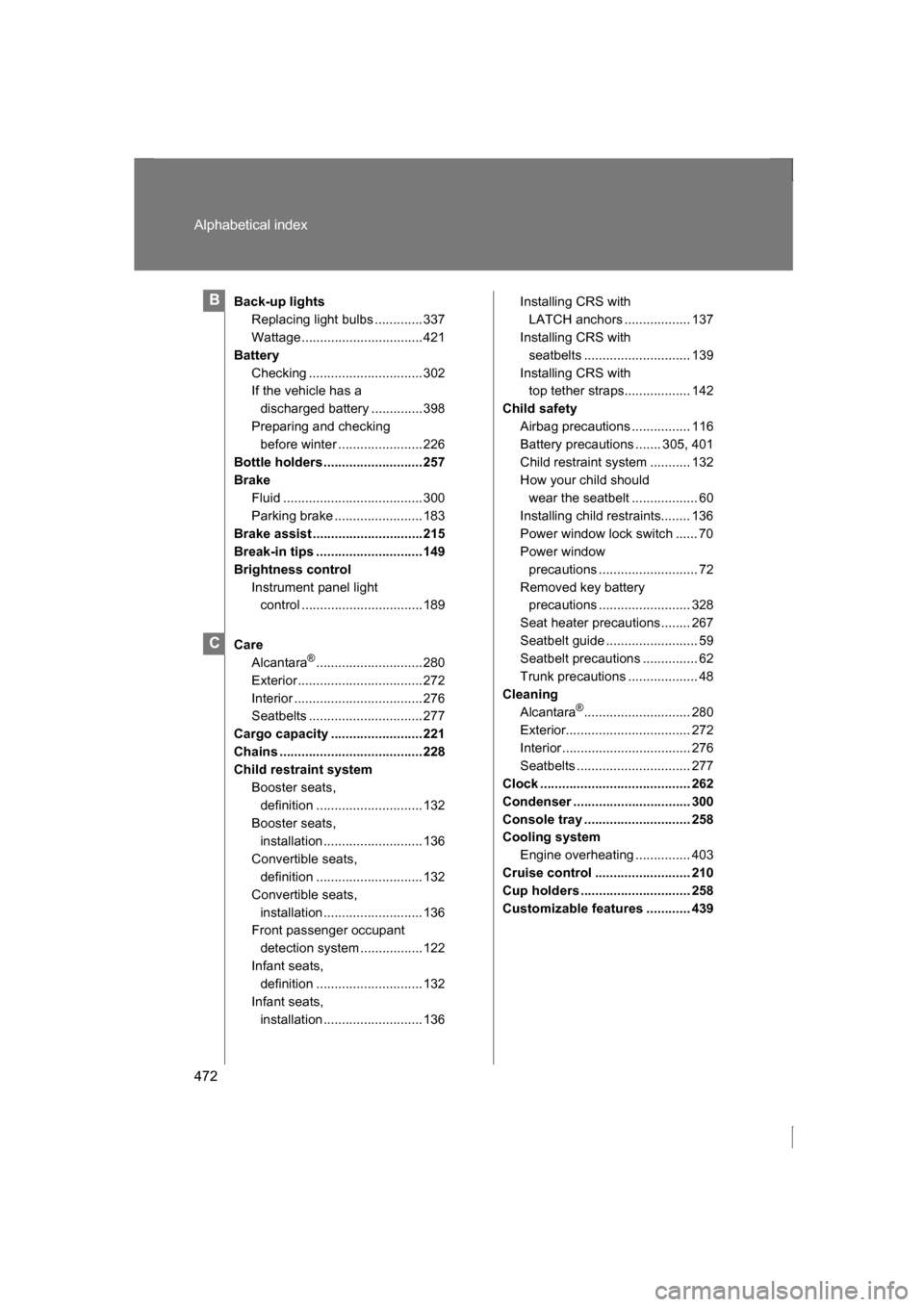Page 414 of 484
414
6-1. Specifications
Lubrication system
* : The engine oil capacity is a reference quantity to be used when changing
the engine oil. Warm up and turn off the engine, wait more than 5 minutes,
and check the oil level on the dipstick.
■Engine oil selection
Always use SUBARU approved engine oil. For details, we recom-
mend that you contact your SUBARU dealer.
If approved engine oil is unavailable, another motor oil of matching
quality can also be used.
Oil grade:
ILSAC multigrade engine oil
API classification SM or SN with the words “ENERGY CONSERV-
ING” or “RESOURCE CONSERVING”
Recommended viscosity: SAE 0W-20
SAE 0W-20 is the best choice for
good fuel economy and good
starting in cold weather.
Oil capacity
(Drain and refill
reference*)
Page 419 of 484
419
6-1. Specifications
6
Vehicle specifications
Brakes
* 1
: Minimum pedal clearance when depressed with a force of 110 lbf (490 N, 50
kgf) while the engine is running.
* 2
: Parking brake lever travel when pulled up with a force of 45.0 lbf (200 N,
20.4 kgf).
■Brake disc
If you need information on the usage limit value of brake discs and
the method for measuring them, we recommend that you consult
your SUBARU dealer.
Pedal clearance *1 2.16 in. (55 mm) Min.
Pedal free play 0.008
0.079 in. (0.2 2.0 mm)
Brake pad wear limit 0.06 in. (1.5 mm)
Parking brake lining wear limit 0.06 in. (1.5 mm)
Parking brake lever travel *2
7 8 clicks
Fluid type FMVSS No.116 fresh DOT 3 or DOT 4
brake fluid
Brake pedal
Pedal
clearance
Carpet
Page 422 of 484

422
6-1. Specifications
Fuel infor mation
■Fuel tank opening for unleaded gasoline
To help prevent incorrect fueling, your SUBARU has a fuel tank opening that
only accommodates the special nozzle on unleaded fuel pumps.
■If your engine knocks
●Consult your SUBARU dealer.
●You may occasionally notice light knocking for a short time while acceler-
ating or driving uphill. This is normal and there is no need for concern.
■Gasoline quality
In very few cases, driveability problems may be caused by the brand of gas-
oline you are using. If driveability problems persist, try changing the brand of
gasoline. If this does not correct the problem, consult your SUBARU dealer.
■Fuel octane rating
This octane rating is the average of the Research Octane and Motor Octane
numbers and is commonly referred to as the Anti Knock Index (AKI).
Using a gasoline with a lower octane rating can cause persistent and heavy
knocking, which can damage the engine. Do not be concerned if your vehi-
cle sometimes knocks lightly when you drive up a hill or when you acceler-
ate. Contact your SUBARU dealer if you use a fuel with the specified octane
rating and your vehicle knocks heavily or persistently.
The engine is designed to operate at maximum performance using
unleaded gasoline with an octane rating of 93 AKI (98 RON) or
higher. If 93 AKI (98 RON) fuel is not readily available in your area,
unleaded gasoline with an octane rating of 91 AKI (95 RON) may be
used with no detriment to engine
durability or driveability. However,
you may notice a slight decrease in maximum engine performance
and you may hear some knocking (pinking) of an engine while using
91 AKI (95 RON) fuel. Use of 91 AKI ( 95 RON) fuel will not affect your
warranty coverage.
Page 423 of 484

423
6-1. Specifications
6
Vehicle specifications
■Gasoline for California-certified LEV
If your vehicle was certified to California’s low emission vehicle (LEV) stan-
dards as indicated on the underhood tune-up label, it is designed to optimize
engine and emission performance with gasoline that meets the clean burn-
ing low-sulfur California gasoline specifications. If you live in any other state
than California, your vehicle will operate on gasoline meeting Federal speci-
fications. Gasoline sold outside California is permitted to have higher sulfur
levels, which may affect the performance of your vehicle’s catalytic converter
and may produce a sulfur exhaust odor or smell. SUBARU recommends that
you try a different brand of unleaded gasoline having lower sulfur to deter-
mine if the problem is fuel related before returning your vehicle to an autho-
rized dealer for service.
■SUBARU recommends the use of gasoline containing detergent addi-
tives
●SUBARU recommends the use of gasoline that contains detergent addi-
tives to avoid build-up of engine deposits.
●All gasoline sold in the US contains detergent additives to clean and/or
keep clean intake systems.
■SUBARU recommends the use of cleaner burning gasoline
Cleaner burning gasoline, including reformulated gasoline that contains oxy-
genates such as ethanol or MTBE (Methyl Tertiary Butyl Ether) is available in
many areas.
SUBARU recommends the use of cleaner burning gasoline and appropri-
ately blended reformulated gasoline. These types of gasoline provide excel-
lent vehicle performance, reduce vehicle emissions and improve air quality.
Page 425 of 484
425
6-1. Specifications
6
Vehicle specifications
CAUTION
■Notice on fuel quality
●Do not use improper fuels. If improper fuels are used the engine will be
damaged.
●Do not use leaded gasoline.
Leaded gasoline can cause damage to your vehicle’s three-way catalytic
converters causing the emission control system to malfunction.
●Do not use gasohol other than that stated here.
Other gasohol may cause fuel system damage or vehicle performance
problems.
●Using unleaded gasoline with an octane number or rating lower than the
level previously stated will cause persistent heavy knocking.
At worst, this will lead to engine damage.
■Fuel-related poor driveability
If after using a different type of fuel, poor driveability is encountered (poor
hot starting, vaporization, engine knocking, etc.), discontinue the use of that
type of fuel.
■When refueling with gasohol
Take care not to spill gasohol. It can damage your vehicle's paint.
Page 432 of 484

432
6-1. Specifications
Warning: The temperature grades of a tire assume that it is properly
inflated and not overloaded.
Excessive speed, underinflation, or excessive loading, either sepa-
rately or in combination, can cause heat buildup and possible tire fail-
ure.
Glossary of tire terminology
Tire related termMeaning
Cold tire inflation
pressure Tire pressure when the vehicle has been
parked for three hours or more, or has not
been driven more than 1 mile or 1.5 km under
that condition
Maximum inflation
pressure The maximum cold inflated pressure to which a
tire may be inflated, shown on the sidewall of
the tire
Recommended
inflation pressure Cold tire inflation pressure recommended by a
manufacturer.
Accessory weight The combined weight (in excess of those stan-
dard items which may be replaced) of auto-
matic transmission, power steering, power
brakes, power windows, power seats, radio
and heater, to the extent that these items are
available as factory-installed equipment
(whether installed or not)
Curb weight The weight of a motor vehicle with standard
equipment, including the maximum capacity of
fuel, oil and coolant, and if so equipped, air
conditioning and additional weight optional
engine
Maximum loaded
vehicle weight The sum of:
(a) Curb weight
(b) Accessory weight
(c) Vehicle capacity weight
(d) Production options weight
Page 441 of 484
441
6-2. Customization
6
Vehicle specifications
Automatic
light control
system (→ P. 200) Light sensor sensitivity ±0% -40% to +40%
Time elapsed before
headlights automati-
cally turn off after doors
are closed
30 seconds0 second
60 seconds
90 seconds
Rear window defogger ( → P. 251) Time elapsed before
the rear window defog-
ger turn off (vehicles
with automatic air con-
ditioning system)
15 minutes Continue
Illumination( → P. 253) Time elapsed before
lights turn off
15 seconds7.5 seconds
30 seconds
Operation when the
doors are unlocked On Off
Operation after the
engine switch is turned
off On Off
Interior light illumination
upon approach (vehi-
cles with a keyless
access with push but-
ton start system) On Off
Interior light illumination On Off
ItemFunctionDefault settingCustomized setting
Page 472 of 484

472
Alphabetical index
Back-up lightsReplacing light bulbs ............. 337
Wattage.................................421
Battery Checking ............................... 302
If the vehicle has a discharged battery ..............398
Preparing and checking before winter ....................... 226
Bottle holders ........................... 257
Brake Fluid ...................................... 300
Parking brake ........................ 183
Brake assist ..............................215
Break-in tips ............................. 149
Brightness control Instrument panel light control .................................189
Care Alcantara ®
............................. 280
Exterior.................................. 272
Interior ................................... 276
Seatbelts ............................... 277
Cargo capacity ......................... 221
Chains ....................................... 228
Child restraint system
Booster seats, definition ............................. 132
Booster seats,
installation ........................... 136
Convertible seats, definition ............................. 132
Convertible seats, installation ........................... 136
Front passenger occupant
detection system .................122
Infant seats, definition ............................. 132
Infant seats, installation ........................... 136 Installing CRS with
LATCH anchors .................. 137
Installing CRS with
seatbelts ............................. 139
Installing CRS with top tether straps.................. 142
Child safety
Airbag precautions ................ 116
Battery precautions ....... 305, 401
Child restraint system ........... 132
How your child should wear the seatbelt .................. 60
Installing child restraints........ 136
Power window lock switch ...... 70
Power window precautions ........................... 72
Removed key battery precautions ......................... 328
Seat heater precautions ........ 267
Seatbelt guide ......................... 59
Seatbelt precautions ............... 62
Trunk precautions ................... 48
Cleaning
Alcantara ®
............................. 280
Exterior.................................. 272
Interior ................................... 276
Seatbelts ............................... 277
Clock ......................................... 262
Condenser ................................ 300
Console tray ............................. 258
Cooling system Engine overheating ............... 403
Cruise control .......................... 210
Cup holders .............................. 258
Customizable features ............ 439B
C